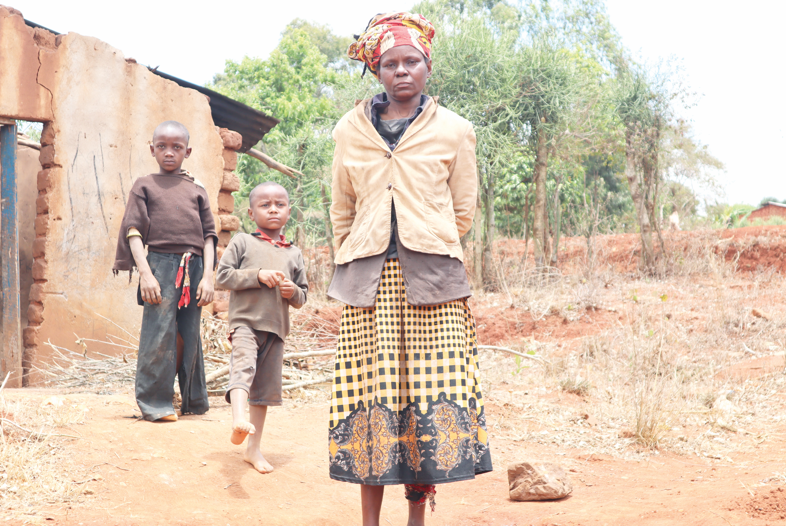Chronic poverty still impedes children
from going to school

Millions of children are still locked out of school despite a free primary education policy introduced by the Kenyan government in 2003.
In many schools across the country, children are required to pay levies for purchase of internal exams, remedial lessons, and school feeding programmes, which some parents cannot afford. As a result, children are frequently sent home to collect the fees.
Such is the case for young Bahati Makau of Kiviani Primary School from Kivani village in Makueni County. As he sits pensively in class, Bahati has not had anything to eat since the previous night and there’s no hope that he will find any meal when he goes back home. His protruding belly is symptomatic of micronutrient deficiencies disease borne out of many days of malnutrition.
Examination fees
But there’s another problem. His class teacher had earlier in the day sent him home for Sh30 examination fees, which is supposed to be paid by every child in Grade Two, but he has come back with nothing.
The school deputy head teacher Gloria Mwende who is new in the school gets concerned. She sends Bahati home to bring his parent.
On reporting to school, his mother Miriam Makau breaks into sobbing when Gloria engages her in a conversation.
Miriam seemed to have sojourned a rough and bumpy journey of life and raising the Sh30 examination fees would be an uphill task for her.
Struck by stroke
Her husband died through a road crash in 2019 leaving her with the responsibility of raising her four children.
Wearing a teary face, Miriam says since the demise of her husband, she’s sojourned a rough and bumpy ride of life. The house she lives in was constructed from the compensation she received after losing her husband.
To add salt to the already gut-wrenching situation, Miriam was met with another rude shock. “I was diagnosed with stroke, which left my right side of the body incapacitated. I was placed under medication, which seemed not to help me. To date, I have never gotten any help,” narrates Miriam.
She only depends on menial jobs to feed her family.
Touched by Miriam’s ordeal, she spoke to Jonathan Kuta, a teacher, from a neighbouring school and member of Hope for Crying African Child who marshalled for support from colleagues and well wishers who did not hesitate to lend a helping hand. “We have seen one of Miriam’s children has marasmus, because of lack of food in the family, and the other child is still not okay. They don’t even have beddings,” Gloria said during a visit with well wishers to Miriam’s home.
Truly free education
Jonathan says education will remain an expensive affair if mechanisms are not revised to favour those hailing from poor backgrounds.
“We’re also asking the government for other ways to further fund schools, so that free education can be truly free, because education in Kenya stopped being free when it was declared free,’’ he states .
Hellen Musyoki the treasurer of the organisation avers that through acquiring education, poverty shall be eradicated.
She admits that many children in Kenya fail to attain education, which hinders their zeal for greater academic goals.
“The problem here is education and poverty, when you get education you’re able to think and be creative. Even if you don’t get employed you get to do something that will help you, such as providing for family basic needs,” remarks Hellen.
She’s now appealing to the government to ensure education is free, that needy cases are given priority and address the hidden cost issue in schools, noting that parents are given the role of meeting costs, such as examination fees, lunches, interview fee, registration fee, school uniforms, transport to and from schools boarding facilities, health care and meals for day scholars.
She, however, feels, their help is not sustainable and is now appealing for well-wishers to come in and help.
According to a 2022 publication by Kijabe Children’s Education Fund, 1.5 million school-going children in Kenya do not attend any school due to poverty and one of two Kenyan girls will never attend school while nine in 10 children from poor households will fail to complete their eighth grade. Through this initiative, the organisation believes that little by little, no learner will be left behind in terms of education.
Poverty, being a major hindrance to education among many learners, partnerships between government and nin-governmental organisations should be bolstered in order to improve levels of education, which falls under the fourth Sustainable Development Goal (SDG 4).









